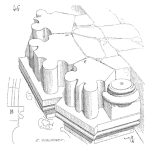
In this age of infinite information at our fingertips, it seems that fewer people are finding reference books and investing in their own libraries. After all, googling whatever’s on your mind is free and easy. But books, especially reference books and textbooks, still have a necessary place in our information age.
For each person, all information can be categorized into three buckets:
- What you know.
- What you know you don’t know.
- What you don’t know you don’t know.
What you know is in your head. What you know you don’t know is what you’re googling. Obviously, you have some clue at what you don’t know; that clue is the string you’re entering in the search box. But how do you figure out what you don’t know you don’t know? Simple … by browsing. You have to look through blocks of information to search for the unknown. This is where reference books come in.
Alexandria, a student in my online classes “Root Cause Analysis and the 8D Corrective Action Process” and “Process Capability Analysis” recently wrote looking for credible sources of information on quality engineering. Here’s our exchange:
Hello Ray,
I am very pleased with this course and the information/tools you have provided us. I am looking into using this information for a Process Validation Study for a client of mine. Although I trust your opinion and the information you provided, are there credible source to reference the information you have provided in this course?
Kind Regards,
Alex
Hello Alex,
Such an awesome question .. thank you so much for asking. I completely appreciate your need for some solid footing in the topics I’ve covered.
As a personal reference, I’ve gone back to the Quality Engineering Handbook by Pyzdek many times, including for this class. My edition is dated 1992, so it’s obsolete in some areas. But a newer edition is now available, and in it you’ll find in it all the major topics I covered.
A second indispensable reference of the quality profession is Juran’s Quality Handbook, currently in its 7th edition. It covers everything quality including a substantial chunk of SPC, capability analysis, all the major distributions, and a ton more stats and analytical methods. The book is expensive because it so big. But I still find my (much cheaper on the used market) 4th edition hugely helpful.
For all things related to reliability engineering, I regularly refer to Practical Reliability Engineering by O’Conner and Kleyner. I’ve looked through many textbooks, and in my opinion, this one offers the shortest trip to an intermediate understanding of RE from the typical foundation of quality engineers like us.
Again … excellent question. I hope these references are useful to you. And thank you so much for taking my course.
If you are looking for your own solid footing in the field of quality engineering, check out the reference books above, and sign up for my low-cost online classes titled “Root Cause Analysis and the 8D Corrective Action Process” and “Process Capability Analysis”. You will find hours of in-depth material based on the best sources and 25+ years of industry experience.
 Ask a question or send along a comment.
Please login to view and use the contact form.
Ask a question or send along a comment.
Please login to view and use the contact form.
Leave a Reply